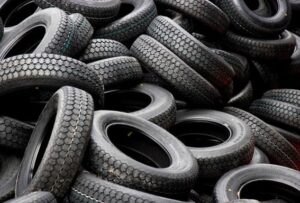The Environmental Hazards of Used Tires and How Tire Recycling Helps

Tires have become a serious solid waste disposal problem and should not be disposed in your curbside recycling and garbage service. On July 1, 1994, whole tires were banned from landfill disposal in the state of Illinois. Placing tires in landfills can lead to many environmental hazards.
They are a fire hazard, contaminate ground water, and become a breeding ground for mosquitoes.
The best way to dispose of tires is to leave them with your tire retailer when you purchase news tires. Retailers are required by law to accept the same number of tires that you buy. If you don’t have that option, as a registered waste tire processor and transporter Tri-State Disposal offers used tire recycling, collection and disposal services throughout Illinois and Indiana.
What Are Some Used Tire Environmental Hazards?
Tires can take hundreds of years to decompose. When they are disposed in a landfill, they occupy large amounts of landfill space for long periods of time. Landfills in the United States are quickly reaching their capacities, and after all U.S. landfills are full, finding new places to dispose of trash will become a difficult feat.
In addition, as these tires decompose over time, they release many cancer-causing chemicals and heavy metals into surrounding soil through leaching. While some of these chemicals remain in the soil, others enter local groundwater supplies where they can also contaminate the water.
Finally, when whole tires go in landfills, the airspace inside of them can fill with methane gas, which is a buoyant gas naturally produced as organic waste in a landfill decomposes. As these tires fill with methane, they can rise to the surface of landfills, destroying landfill liners that shield the surrounding soil and water.
When tires are stockpiled, they become a fire hazard. If ignited the tires could produce toxic smoke and oils that can lead to the pollution of land, water, and air.
Rainwater tends to collect in stockpiled tires, which then become a breeding ground for mosquitoes that carry dangerous diseases such as West Nile Virus and encephalitis. Over the course of one breeding season, hundreds of mosquitoes can be generated from just one tire.
How Does Recycling Tires Help the Environment?
When you recycle tires instead of disposing of them in landfills, you can prevent soil and groundwater pollution and help preserve landfill space. However, you also help the environment in several other ways.
Help Create Biofuel
Recycled tires help create a newer type of biofuel called tire-derived fuel (TDF). In fact, about half of all tires recycled today create this fuel type. Tire-derived fuel produces fewer pollutants when burned than coal-derived fuel. Tire-derived fuel is also more inexpensive, energy-efficient, and sustainable than fuel produced from the burning of coal.
Aid in Tire-Derived Aggregate Production
Recycled tires help create tire-derived aggregates (TDAs) common in civil engineering projects. Just a few of these important projects include road repairs, retaining wall backfilling, and road insulation installation. When people use recycled tires during these projects, new materials do not have to be used that require a large amount of energy or unsustainable natural resources to produce.
Contribute to More Environmentally Friendly Roadways
Another use for recycled tires is in rubber-modified asphalt creation. This asphalt type is not only more environmentally friendly than traditional asphalt, but it is also considered a superior road material for many reasons.
Rubber-modified asphalt is not only more affordable than traditional asphalt, but also has a longer lifespan. In addition, creating and installing this asphalt type produces much less carbon dioxide (C02), which is an environmental pollutant, than traditional asphalt.
Finally, roads of rubber-modified asphalt tend to have lower rolling resistance than those with traditional asphalt. The fuel efficiency of gasoline-powered vehicles increases when driving on a surface that has low rolling resistance.
Donate to Tire Retreading Efforts
Many recycled tires are retreaded every year in the United States, and the tire retreading industry has a very positive impact on the environment. To retread a tire, people buff away the old, worn-down treads on a used tire casing and replace them with a new tread liner. Then, the tire casing and tread liner are heated together in a pressure chamber to permanently fuse the new treads to the tire.
The retreading process for a tire requires much less energy and fewer raw materials than the creation of a new tire does. In addition, retreaded tires typically cost much less than brand-new tires, so this industry helps people on tight budgets stay safe on the road when they cannot afford brand-new tires.
Whether your state bans tires in landfills or not, always recycle your used tires instead of disposing of them in the trash. Used tires in landfills contribute to environmental pollution, while recycling these tires allows them to be useful in many ways that benefit the environment.
What to do with unwanted tires
Do not store or accumulate your old tires, trade them in when you purchase new ones.
Contact the recycling and waste management experts at Tri-State Disposal for all of your used tire recycling needs today. We work with individuals and businesses to dispose of tires responsibly and provide a second life for tires. For more information about used tire recycling, collection and disposal, contact Tri-State Disposal.
